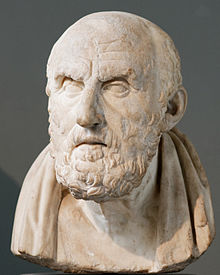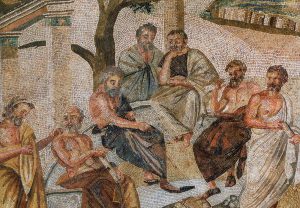Stoicism, particularly in its ethical and political aspects (a defense of individual self-mastery on the one hand and commercial society on the other – for the latter, see, e.g., Cicero’s De Officiis), has been enormously influential throughout western history. During the Roman period it took on something like the character of a mass religious movement; Stoics were also statistically overrepresented among assassins or attempted assassins of Roman emperors. (One third of all Roman emperors died by assassination, so that’s not an insignificant number.) Later on, philosophical thinkers as diverse as Augustine, Descartes, Spinoza, Locke, Adam Smith, and Kant would draw on Stoic ideas (though always selectively) in crafting their own ethical and political views.

Cato regrets that he will not be at home to entertain Julius Caesar.
It was also common for anti-imperialist, anti-monarchical writers in the 18th century, including many of the American founders (such as New York governor, Anti-federalist campaigner, and later u.s. vice-president George Clinton – not the musician, alas), as well as British radical republicans like Trenchard and Gordon (authors of Cato’s Letters), to sign their anonymous pamphlets with the name of Cato (the Younger), the Stoic who resisted Julius Caesar’s rise to power. George Washington had Joseph Addison’s play about Cato performed at Valley Forge to inspire the troops. (The Cato Institute also takes its name from this tradition.)
Stoicism is undergoing a bit of a renaissance today, both in academic philosophy (partly because it’s seen as a way of mediating between the eudaimonistic, virtue-ethical Aristotelean approach and the deontological Kantian approach; partly because of Foucault’s role, in his later works, of reviving the “care of the self” tradition in ethics) and in works of popular psychology. (There’s also a striking similarity between the Stoic theory of the emotions and that of Sartre, though I’m not aware that anyone besides myself has commented on this.)

The Stoa today, perhaps after a Randian bombing campaign.
Primarily in response to the popular-psychology use of Stoicism, Randian scholar Aaron Smith has an article up today warning against the perilous influence of the Stoa and urging the preferability of the Randian alternative. (CHT Sheldon Richman.)
I find Smith’s piece a bit frustrating. I mean, I’m broadly sympathetic with his criticisms of Stoicism, but Smith makes it sound, e.g., as though the Stoics had nothing to say about how to reconcile free will with determinism, whereas they had a fairly well-worked out and sophisticated theory.
Identifying the details of the theory is admittedly a bit tricky, as there’s no one canonical Stoic text or even author. The problem is that the theoretical foundations of Stoicism were in Greek manuscripts – by e.g. Zeno of Citium, Cleanthes, Poseidonius, Panætius, etc., and above all by the brilliant and prolific Chrysippus (who to all evidence appears to have been a mind in the same league as Plato and Aristotle) – that are mostly lost. We have to reconstruct their views from quotations, reports, etc. in other authors. (Some famous classical scholar – I forget who – once said he would rather recover a single lost page of Heracleitus than all of the purported 700 or so lost works of Chrysippus. For my part, I confess I would rather recover a single page of Chrysippus than all of Heracleitus.) The Stoic texts that survive intact are not foundational texts; they’re popularising works (mostly, though not exclusively, Roman) that focus more on self-help than on philosophical foundations; of this nature (a bit like the pop-psychology Stoicism books today, actually, though rather better written) are the works of Seneca, Epictetus, Marcus Aurelius, etc. (and Cicero, when he has his Stoic hat on), though they do occasionally refer helpfully if not extensively to some of the background theoretical material. So reconstructing Stoic doctrine is a bit of a jigsaw puzzle task. Happily, we have a lot of pieces so the task is not intractable.

Chrysippus, on being told that all 700 of his works have gone missing.
In any case, the basic idea is that something is up to you if it can be caused by your act of rational judgment, without any further causal factors needed once your act of rational judgment occurs. The fact that your act of rational judgment itself has deterministic causal antecedents is irrelevant, on their view. For something to be up to you is for its happening or not happening to depend on what rational judgment you form. (In other words, a) the causal chain has to go through your act of rational judgment rather than bypassing it [that’s a standard compatibilist or soft determinist move], and b) [and here comes the distinctive interiorising Stoic move that most compatibilists would not sign on to] the causal chain has to go solely through that act of rational judgment, rather than the outcome’s depending on interaction between internal and external causal chains.)
I don’t think this view (either the (a) part or the (b) part) ultimately works (for some of my problems with views like (a), see this paper), but it’s not something that can be refuted simply by pointing to a few Stoic quotations and saying “look! they say they believe in free will, but they also say they believe in determinism! Contradiction! Guilty!”
It would also have been interesting for Smith to have explored the similarities (sometimes quite strong) and differences (also strong, of course) between Stoic and Randian views about the emotions, the relation between ethics and human nature, etc.

Howard Roark, contemplating what he cannot control.
For example, when Howard Roark, the protagonist of Rand’s novel The Fountainhead, says:
“I’m not capable of suffering completely. I never have. It goes only down to a certain point and then it stops. As long as there is that untouched point, it’s not really pain.”
– he sounds pretty damn Stoic. (Though so does Dominique, whose quest is nevertheless for an invulnerability subtly but crucially unlike Roark’s, in ways that would be worth teasing out in this context.)
Likewise, when the Roman Stoic Seneca says:
“A living being has an attachment to itself, for there must be a standard by which all other things are judged. … Since I treat my own welfare as the standard for all my actions, I am concerned for myself above everything else. … Every living thing has an initial attachment to its own constitution; but a human being’s constitution is a rational one, and so a human being’s attachment is to himself not qua living being but qua rational being. For he is dear to himself in respect of what makes him human.”
– he sounds pretty damn Randian. Though again there are important differences too.

Make philosophy, not war: A mosaic of Plato’s Academy, from Pompeii.
Really the article exemplifies a recurring problem with Rand’s own approach to philosophy, which too many of her followers have likewise embraced: an emphasis first and foremost on philosophy as war, as a matter of crushing the wrong views, which tends to lead, if not exactly to a “shoot first and ask questions later” approach, then at least an approach of “ask a few questions, and if the answers don’t sound quite right, start shooting without investigating too closely, trying to sort friend from foe, or trying to convert foe to friend.” Philosophy as a battleground, not as a field of potentially fruitful exchange. Thus it’s not philosophia, love of wisdom, so much as philonikia, love of victory. And so this piece passes up any opportunity of the form “let’s try to use Stoic ideas as useful occasions to think and learn about these issues” in favour of jealously guarding the faithful against lapses into heresy. (Of course the same criticisms apply to mainstream academic philosophers’ engagement with Rand.)
In philosophy I generally find a military or policing approach less valuable than a catallactic approach, in Hayek’s sense of the word:
“These terms [e.g., catallactics, catallaxy] are particularly attractive because the classical Greek word from which they stem, katalattein or katalassein, meant not only ‘to exchange’ but also ‘to receive into the community’ and ‘to turn from enemy into friend’, further evidence of the profound insight of the ancient Greeks in such matters ….”
Admittedly, this is an insight that the ancient Greek philosophical schools often lost sight of when they were engaging with one another. But we should strive to imitate their best moments, not their worst ones.